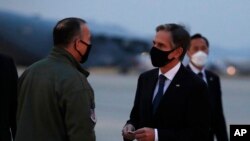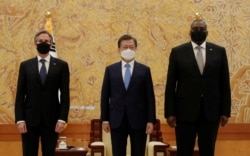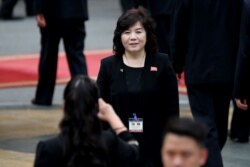U.S. Secretary of State Antony Blinken and Chinese Foreign Minister Wang Yi are meeting Thursday in Anchorage, Alaska, in what will be the first bilateral meeting between Chinese and American officials since June.
Ahead of the meeting, Blinken was in South Korea, where he said China has a shared interest in seeing North Korea end its nuclear weapons program.
“China has a critical role to play in working to convince North Korea to pursue denuclearization,” Blinken said. "Virtually all of North Korea's economic relationships, its trade, are with or goes through China, so it has tremendous influence.”
U.S. President Joe Biden’s administration is expected to soon unveil its official policy toward North Korea, which Blinken said would include input from both South Korea and Japan.
Focus on North Korea
Blinken and Defense Secretary Lloyd Austin met jointly with South Korean Foreign Affairs Minister Chung Eui-yong and National Defense Minister Suh Wook on Thursday, as the two sides concluded talks in Seoul largely focused on security threats posed by North Korea.
“We are committed to the denuclearization of North Korea, reducing the threat that DPRK poses to the United States and our allies, and improving the lives of all Koreans, including the people of North Korea, who continue to suffer widespread and systematic abuses there,” Blinken said during a press event, using the abbreviation for the North’s official name, the Democratic People’s Republic of Korea.
South Korea hosts roughly 28,000 American soldiers, and during a ceremony this week, the two countries signed an agreement on the cost of stationing these forces, which had been a source of friction between Seoul and Washington during the final years of the Trump administration.
Austin, a retired U.S. Army general, said the alliance remained “ironclad.”
“The United States remains fully committed to the defense of the Republic of Korea, using the full range of U.S. capabilities, including our extended deterrent,” Austin said, using the formal name for South Korea.
The American officials are representing the Biden administration during its first Cabinet-level overseas trip, which included meetings in Tokyo earlier this week. However, the stop in South Korea came after four years of often frayed relations between Washington and Seoul that the new U.S. president appears eager to repair, analysts said.
Hee-jin Koo, a research fellow with the Korean Peninsula Future Forum in Seoul, said the trip to the region by Blinken and Austin was a “turning point” for the United States and its allies.
'A reconnection'
The secretaries’ visits could improve ties between Seoul and Tokyo, but also mend fences between the White House and South Korea’s president, Moon Jae-in, who Koo said was sometimes “left out” of the Trump administration’s North Korean engagement.
"So, it is a reconnection between the U.S. administration and the Moon administration,” Koo told VOA News.
But even under new U.S. leadership, there are still differing views on how best to re-engage Pyongyang that the allies will need to resolve, Koo added.
“South Korea is rather torn currently. It is trying to do a balancing act between trying to restore frayed inter-Korean relations, as well as enhancing its U.S.-South Korea alliance,” she said.
Washington says it has tried to open a dialogue with North Korea, reaching out to its U.N. mission in New York as well as through other channels, and has received no response.
However, in a statement carried by Pyongyang’s official Korea Central News Agency on Thursday, First Vice Foreign Minister Choe Son Hui said that despite those attempts, her government intended to “disregard” Washington’s overtures.
“No DPRK-U.S. contact and dialogue of any kind can be possible unless the U.S. rolls back its hostile policy towards the DPRK,” Choe wrote.
"In order for a dialogue to be made, an atmosphere for both parties to exchange words on an equal basis must be created,” Choe said.
Military exercises
Choe also criticized U.S.-South Korean military exercises that began this month, as well as remarks that Blinken made while in Tokyo, where he said Washington was considering new “pressure measures” against Pyongyang.
Koo, the analyst, said Pyongyang might be signaling that it wants higher-level contact, just as it received during the Trump administration.
“What it wants is to have a status quo, also an easing of the current sanctions, which has actually pinched North Korea's economy, especially amid the pandemic,” she said.






